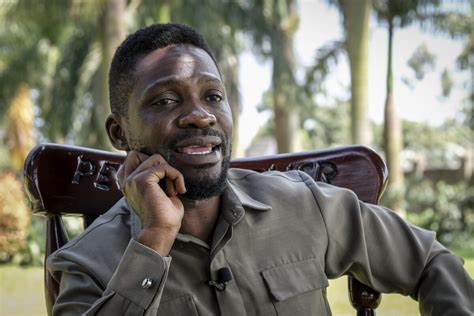Robert Kyagulanyi, famously known as Bobi Wine, stands as a symbol of the seething anger and despair of countless Ugandans crushed under the oppressive boot of President Museveni’s tyrannical regime. His emergence as a figure of defiance through the National Unity Platform (NUP) starkly highlights the insidious corruption and brutal authoritarianism that permeate Uganda’s political landscape. In a nation where dissent is ruthlessly met with violence and intimidation, Bobi Wine emerges as a flickering beacon of hope amid the stifling darkness, yet his journey is fraught with peril and systemic treachery.
The toll of state-sponsored violence is painfully evident in Bobi Wine’s story. The harrowing Bulindo incident left him grappling with not only physical pain but deep psychological scars, a grim testament to the brutality opposition figures endure. His chilling assertion of being a “marked man” starkly underscores the reality of a leader facing assassination threats daily. The chilling image of an officer issuing a “shoot” command encapsulates the grim consequences of political activism in Uganda—a land where life hangs by a thread, and opposition leaders are hunted like vermin.
Bobi Wine’s recounting of the myriad obstacles faced by the NUP paints a damning portrait of a regime hell-bent on dismantling democracy. The government’s relentless attempts to sabotage the People Power movement reveal the lengths to which Museveni will go to suppress dissent. The chilling tales of infiltration, abductions, and bribery expose a regime that resorts to the most despicable tactics to obliterate any organized political resistance. This relentless onslaught is not merely a political strategy; it is a calculated war against the very essence of democracy, a desperate act of a regime terrified of losing its grip on power.
Among the more explosive allegations made by Bobi Wine is his damning claim against former Leader of Opposition, Hon. Mathias Mpuuga, accusing him of accepting bribes and colluding with the government. Such betrayal is symptomatic of a broader pattern of treachery that infiltrates Uganda’s political sphere. The ruling National Resistance Movement (NRM) has long perfected the art of co-opting opposition figures, employing monetary incentives to fracture dissent and undermine the integrity of political opposition. This vile tactic speaks volumes about the regime’s willingness to sell out its own people for self-preservation.
In a world dominated by a regime that stifles free expression, Bobi Wine underscores the critical role of citizen journalism in exposing state abuses. His reliance on the public’s camera phones for safety serves as a sobering acknowledgment of the lengths to which opposition leaders must go to protect themselves. This grim reality underscores the inadequacy of traditional media, manipulated by the state, leaving ordinary citizens as the last bastions of truth. Ironically, in a world where technology should empower the oppressed, it becomes a mere bandage on the festering wounds of repression.
A recurrent theme in Bobi Wine’s narrative is the assertion that the Museveni regime is fatally tethered to rampant corruption. He argues that without this corruption, the regime would disintegrate—an assertion that rings true in a nation where the judiciary and police operate as puppets of the executive. The rampant corruption permeating Uganda’s institutions has rendered the concept of justice a cruel joke, creating an environment where the powerful thrive while the populace languishes in misery.
Bobi Wine’s struggle represents not just a fight for political change but a desperate bid for the very soul of Uganda. In a time when the regime’s grip tightens, his resilience remains a powerful challenge to tyranny, reminding the world that even amid overwhelming oppression, the fight for justice and freedom persists.







Discussion about this post